The first step is admitting you have a problem. That famous first step isn’t typically related to career breaks and long-term travel. But it is important for you to realize that you will experience culture shock at some point during your career break. It could be day one, it could be day ten, it could be day one hundred thirty seven. But at some point, you will be overwhelmed by your surroundings.
The key is preparing and dealing with it in a positive manner to get over it as quickly as possible and get on with your travels. You may go through different stages during your career break, and you never know when culture shock will strike. It might not necessarily happen right at the very beginning of your trip either, so it’s important to be prepared and know what to do when it happens.
![]()
Prepare Yourself Before You Go
There are several things you can do to help prepare yourself for culture shock before leaving. You already know that some things are going to be very different. In some places, everything will seem completely upside down, and you’ll feel like you’ve entered the bizarro world (India, anyone?). While you’ll never be able to replicate what’s going to happen on the road, there are certain things you can do to prepare yourself for what lies ahead.
Learn some of the local language
Wherever you go first, it’s probably a good idea to learn some of the local language. If you start in Latin America, realize that English is still spoken quite a bit, but for the most part, you’re going to need some Spanish to get around. Taking a Spanish class before you leave will help tremendously in your adjustment upon arrival, and there are plenty of places to do it.
- There are free online resources, including an awesome page on BBC’s site that offers free online courses in several languages.
- Lenguajero is also a free language learning community where people meet to practice conversational Spanish and English.
- Community colleges often offer pretty cheap travel related language classes.
- Check out “lessons and tutoring” under “services offered” on Craig’s List – sometimes you can work out a language exchange with a tutor where you’ll meet with someone and help each other out.
- At the very least, learning key phrases – hello, good bye, thank you, you’re welcome, how much does it cost, where is the bathroom, etc. – is always a good idea. You’d be amazed at the response you get from locals when you at least try to use their language.
![]()
Be brave in what you eat
Part of traveling is trying new, interesting, and sometimes really unique food. If you’re a picky eater, it’s time to change your habits. You will have to be open to new things, especially if you don’t want to spend 2-3 times more on food than you have to. Eating in western restaurants are usually much more expensive than eating locally.
Before you leave for your trip, you can start training yourself by going to new restaurants. Eat ethnic food you’ve never eaten before. Order something off the menu that you don’t recognize, and don’t ask the server what it is (the point and smile method of ordering is commonplace for many travelers in different areas of the world). Start getting in the habit of not really knowing what’s going to come out of the kitchen on your plate. It’s sometimes a scary yet exciting thing, and it’s going to be the norm when you’re out on your career break.
![]()
Read and research your destination as much as possible
You would think this is a common sense tip, but you’d be amazed at the amount of people who don’t read up on the culture and everyday life of the place they are visiting. You know those beginning parts of a guidebook that talk about the history, customs, and culture of a country or city? Read those! Knowing about the people, the customs, and what they’ve gone through is a huge part of trying to understand their culture. Understanding that putting your feet up in an Asian country can be highly offensive is a very important thing to know. In fact, voicing anything negative about the King in Thailand could land you in jail!
Reading about common scams and tips for not being taken advantage of is also a great idea. Anyone going to Bangkok should already know before touching down that tuk-tuk drivers are notorious scammers. When you want to go to one of the famous sites, the Grand Palace, chances are they will tell you it’s closed today, and they’ll instead take you on a ride (literally) all around Bangkok, seeing some temples but also to their buddies’ jewelry shops, rug shops, and any other shop a friend might own. The scam is mentioned in nearly everything written about Bangkok, yet unsuspecting travelers fall for it every single day. This would never happen if people just read up on a country before visiting.
![]()
Talk to people who have been there
It’s never been easier to obtain first-hand information about a place than it is today. With social media sites and blogs, getting instant feedback is the norm. Bloggers in particular are very forthright when it comes to helping people out and answering questions about a place. So if you’re reading a particular post about a country you’re going to and you have some questions, contact that person and ask. Chances are he or she would love to talk with you about your upcoming trip and answer any questions you may have. Getting the lay of the land before leaving, and knowing what to expect in certain situations will help keep you comfortable and will help tremendously so you don’t feel too out of place. And what better way to get that information than from someone who is there now?
![]()
What to Do On the Road to Combat Culture Shock
If you decide to uproot your life by taking a career break to travel the world, you will be going through a roller coaster of emotions upon your departure. Nervousness, fear, excitement, elation – all those emotions will be coursing through your body when you get on that first flight. Upon touching down, everything may be a bit overwhelming, crazy, and new, but chances are you will be so amped up and excited that the culture shock may not hit immediately.
This honeymoon period may last a few weeks, a month, or even more. Everything will be new, everything will be exciting, everything will be the best ever. When you have those feelings, even though you may be overwhelmed at times, that excitement and joy seems to overtake any culture shock you may feel. After a while on the road, though, those things that at first excited you may start to annoy you. That tuk-tuk driver who hassles you every morning when leaving your hostel is suddenly aggravating instead of funny. The fact that you can’t communicate starts to become a burden. The lack of a routine starts to get tiresome instead of fun and exhilarating. When these feelings start to pop up, it means the honeymoon is over. Time to readjust.
![]()
Learn the language
If you ignored the advice given in the pre-trip section, chances are you will change your tune once on the road. After a while, not being able to communicate becomes difficult and tiresome. Only being able to talk to other travelers or your traveling partner is annoying after a while, and not being able to ask simple questions becomes really difficult. In most countries, though, there are plenty of opportunities to learn the local language. Language schools about in many places, and full immersion classes are usually the way to go. You’d be amazed at how much you can learn in just a few weeks of language classes, and how much of a difference in will make.
If language classes don’t fit into your schedule, you should at least bring a phrase book with you, or check out the various language phrase apps by World Nomads.
![]()
Travel slowly
Traveling slowly is something you should do to avoid travel burnout and burning through your money quickly. The longer you stay in a particular place, the more you learn about the culture and customs, and the more comfortable you’ll feel there. Really getting to know a place is just as valuable (if not more) than ticking sites off your list. By traveling slowly, it’s a lot easier to deal with the differences in cultures and not suffer from culture shock. Moving often and quickly not only throws you into different cultural situations all the time, but it starts to become stressful. Constantly packing and unpacking, having to catch an early bus or train, traveling overnight – it all becomes tiresome after a while, and the more tired you are, the more prone to culture shock and burnout you become.
![]()
Know when to say “No!” and when to say “Yes!”
Part of travel, particularly in developing countries, is dealing with touts and people constantly asking you for things. At first, this can be cute and funny. After a while, it just becomes annoying. You don’t necessarily want to become jaded towards local people and always be stand-offish, but it’s important to find a balance between talking to everyone and shrugging everyone off. After a while, you start to develop a sixth sense for recognizing the touts who are only going to hassle you. Don’t be afraid to firmly say “No!” and keep going. Walk with an air of confidence, like you live there and know what’s going on. On the flip side, there are so many warm and inviting people you’ll meet while traveling, so it’s important not to dismiss everyone. You may miss out on an incredible opportunity by automatically thinking someone wants something from you. Trust your instincts.
![]()
Develop a slight routine
One of the main reasons people decide to take a career break is to get out of daily routines. Getting up and constantly doing the same things every day gets boring. So why would we suggest developing a routine on the road? We are creatures of habit, and after traveling for a few months, we start to get anxious without having any kind of routine. The “What do you want to do?” question and answer sessions if you’re traveling with someone else get infuriating after a while. You don’t have to do the same things every day, but just doing something simple, like getting up for a run or long walk each morning before breakfast can make all the difference in the world. Consider hunkering down in one city for a month or so, rent an apartment, unpack your bags, and live a somewhat normal life for a bit. This is a great way to really immerse yourself in a culture (and a perfect time to take some language classes), and the routine you develop, if only for a month, will re-energize you for what’s to come.
![]()
Never underestimate the importance of a big, hearty smile. Not only does it make you feel better, but it makes those around you get the warm and fuzzies. If you really aren’t clicking with a particular place or its people, offer up a warm smile the next time you encounter a local and chances are you’ll get one right back. A nice smile can really make you feel great, and when you’re feeling down and overwhelmed, it really can make a difference.
![]()
It’s important to know that you will experience culture shock and travel burnout at some point along the journey that is your career break. Even if you follow all these tips, it’s still going to happen. Whenever you take someone out of his or her comfort zones, no matter how much preparation that person has done, it’s inevitable he or she will feel overwhelmed at some point. You simply can’t prepare for every situation. What’s important is recognizing those feelings quickly and doing something about it.
![]()
Struggles On the Road
JoAnna Haugen shares how those “A-ha Moments” you experience on the road help you deal with the daily struggles you may be facing.
Photo credits: Shane Global Language Centres,
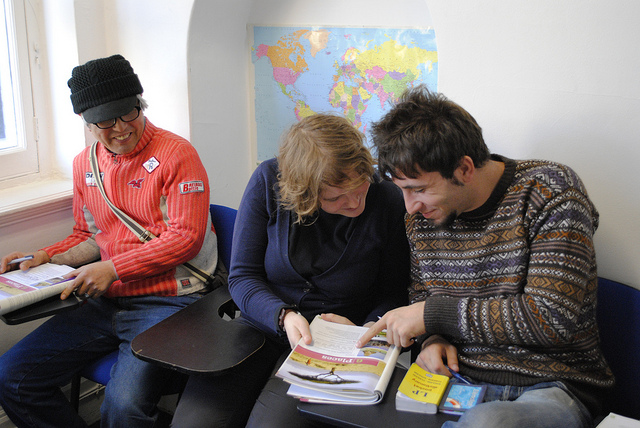





 Jannell Howell recently returned from an around-the-world journey that took her through many countries including Thailand, India, the U.A.E., and Europe. Before she left, Jannell discovered a love of researching travel-related gear & services and shared her favorite finds on her blog,
Jannell Howell recently returned from an around-the-world journey that took her through many countries including Thailand, India, the U.A.E., and Europe. Before she left, Jannell discovered a love of researching travel-related gear & services and shared her favorite finds on her blog, 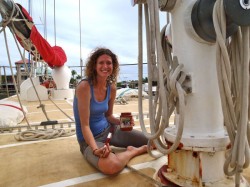 Kelly Wetherington has been traveling since she first escaped her cubicle in 2007. Her insatiable curiosity for the world and thirst for adventure have led her to trek, dive, sail, zip, surf, climb, and paddle her way through 25 countries across Central America, Europe, Southeast Asia, and the Pacific. Last spring, she shared the story of landing her first crewing job:
Kelly Wetherington has been traveling since she first escaped her cubicle in 2007. Her insatiable curiosity for the world and thirst for adventure have led her to trek, dive, sail, zip, surf, climb, and paddle her way through 25 countries across Central America, Europe, Southeast Asia, and the Pacific. Last spring, she shared the story of landing her first crewing job: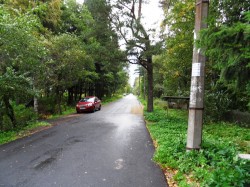 Katie Aune spent her 13-month career break traveling through the former Soviet Union. Along the way, she stayed with several host families and shared her thoughts on the ups and downs, as well as advice on what to consider if you’re planning to do a homestay.
Katie Aune spent her 13-month career break traveling through the former Soviet Union. Along the way, she stayed with several host families and shared her thoughts on the ups and downs, as well as advice on what to consider if you’re planning to do a homestay. Leora Krause is a travel addict who started circling the globe when she was old enough to vote. Recently downsized from corporate America, she enjoyed her second career break in 2012, traveling through Thailand, Vietnam, India and Nepal. She wrote about having to regroup after an airline she was supposed to fly went out of business.
Leora Krause is a travel addict who started circling the globe when she was old enough to vote. Recently downsized from corporate America, she enjoyed her second career break in 2012, traveling through Thailand, Vietnam, India and Nepal. She wrote about having to regroup after an airline she was supposed to fly went out of business.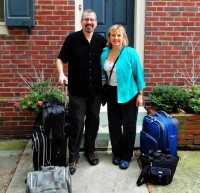 Larissa & Michael Milne turned 50, sold everything and embarked on a 1+ year round-the-world trip in August 2011. In this post, they shared how they made their career break work with rolling suitcases and apartment rentals.
Larissa & Michael Milne turned 50, sold everything and embarked on a 1+ year round-the-world trip in August 2011. In this post, they shared how they made their career break work with rolling suitcases and apartment rentals.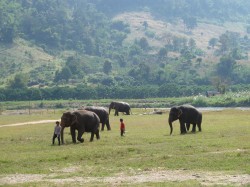 After leaving her job as an associate with a large law firm, Robin Devaux spent approximately eleven months traveling the world with her husband, Pierre, visiting five continents and 24 countries. She also got to finally fulfill her life-long dream of working with elephants.
After leaving her job as an associate with a large law firm, Robin Devaux spent approximately eleven months traveling the world with her husband, Pierre, visiting five continents and 24 countries. She also got to finally fulfill her life-long dream of working with elephants. The Van Loen family left their “normal” life in July 2012 to spend a year slow traveling around the world. Here, they share their rationale for hitting the road as a family.
The Van Loen family left their “normal” life in July 2012 to spend a year slow traveling around the world. Here, they share their rationale for hitting the road as a family.





